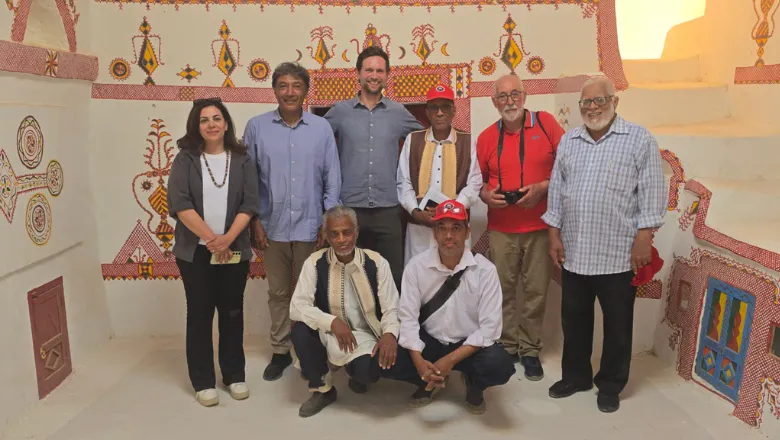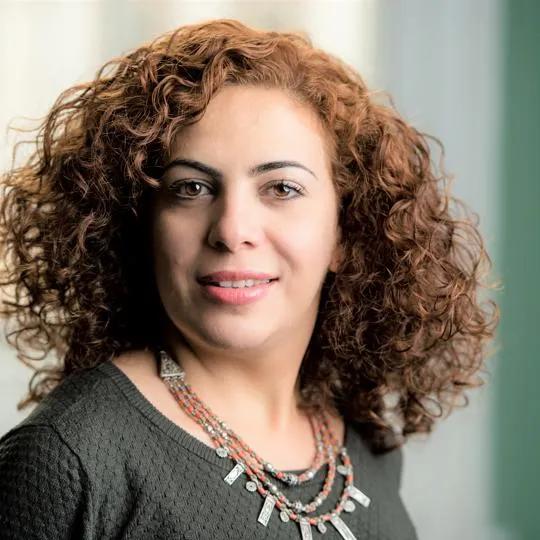This is the result of an enormous amount of work and deep collaboration between the partners. We’ve been honoured to work with such committed Libyan colleagues and their local communities. Over the course of the last 5 years we have built strong ties based on trust and shared interests and goals. The result is a greater understanding of Ghadames and its challenges alongside a stronger and more capable community with the knowledge and skills to deal with them. In addition there is a renovated building which carries new possibilities to showcase the extraordinary ways in which the local peoples have adapted to their harsh environment including sustainable technologies and specific social customs, such as highly-skilled arts and crafts. Our collaboration will continue through this new centre. Finally we thank and congratulate all those involved for their dedication and hard work. This is a fantastic achievement.
Dr Will Wootton, Director of the MaLiCH project
31 July 2025
King's project helps to remove Libyan World Heritage Site from UNESCO's List of World Heritage in Danger
King's MaLiCH project celebrates success as the historic Old Town of Ghadames, Libya is removed from danger list.

Work towards preserving cultural heritage in Ghadames, Libya has led to the site being officially removed from UNESCO’s List of World Heritage in Danger. The announcement was made during the 47th session of the UNESCO World Heritage Committee, following five years of collaborative, community-led conservation work spearheaded by the Managing Libya’s Cultural Heritage (MaLiCH) project led by King's Department of Classics.
The MaLiCH project began in 2020 with funding from ALIPH (The International Alliance for the Protection of Heritage). The project brought together a wide range of Libyan and international partners including the Libyan Department of Antiquities (DoA), the Ghadames City Promotion and Development Authority (GCPDA), the Permanent Delegation of Libya to UNESCO, Bayt Alyakaniya for Heritage and Arts in Cairo, and local civil society.
The Old Town of Ghadames, inscribed as a World Heritage Site in 1986, was placed on the Danger List in 2016 due to the compounded risks of conflict and climate change. In response, the MaLiCH project developed a comprehensive, locally informed action plan, involving emergency stabilisation, traditional knowledge documentation, training of local heritage professionals, and the revival of women-led crafts such as Zanjafor painting.
This journey was not just about buildings, it was about rebuilding trust, livelihoods, and intergenerational knowledge. We learned to co-create with local partners and to centre their priorities in every step. That’s a research model I’m proud of and one that shifts from extractive observation to mutual transformation.
Dr Hiba Alkhalaf, Co-Director of the MaLiCH project
When sites are removed from the List of World Heritage in Danger, it is a great victory for all. For the countries and communities directly concerned, for UNESCO and, more broadly, for the shared heritage of humanity. We are pursuing a special effort for Africa, both to train experts and facilitate new inscriptions, and to support strategies to bring some sites out of danger. These efforts are paying off today.
Audrey Azoulay, UNESCO Director-General
The project culminated in the opening of a new Visitor Centre, positioning Ghadames as a model for inclusive heritage-led development. In recognition of its innovative approach, MaLiCH was awarded the ICCROM-Sharjah Award for Good Practices in the Preservation and Protection of Cultural Heritage in the Arab Region in 2024. The methodologies developed through the project are now informing work in other post-conflict settings.
“What truly matters in the removal of Ghadames from the Danger List is not the end result, but the process itself,” said Dr Hiba Alkhalaf. “It was through this journey that we were able to co-develop local tools, identify the core values of the site, assess the layered impact of conflict, and implement corrective measures – all while planning for long-term, community-led management. As a Syrian researcher, I see this as a profoundly relevant and transferable model. The lessons from Ghadames are already shaping our approach to heritage recovery in Syria, where six UNESCO-listed sites remain on the List of World Heritage in Danger.”
Dr Hafed Walda, the previous ambassadors of the Permanent Delegation of Libya to UNESCO in Paris and member of the project team added, “The removal of Ghadames from the UNESCO Danger List stands as a testament to the power of community-led heritage conservation. It demonstrates how cultural significance, climate resilience, and strategic planning can come together to deliver lasting impact. This success – marked by youth engagement, restoration efforts, and forward-looking management – was validated by an international monitoring mission in February 2025.”



